School of Art - Masters Program Options
The following programs include Masters program options:
Master of Photography
Master of Fine Art
MA (Arts Management)
MA (Art in Public Space)
On this page you will find information about these postgraduate program options, as well as postgraduate University Electives.
Please note that offerings can be subject to change.
To add a University Elective in Enrolment Online, choose the 'Class Search' tab, select the relevant Term, and search for the name or course code of the course you are interested in.
For more information about a course, please contact the Offering Coordinator.
Please note: although we would like to offer all of the courses below, courses are subject to viability and may not run if numbers are too low.
Course Information
Masters Program Options
Semester 1 - Masters Program Options
- OART1067: Introduction to Curating Contemporary Art
- VART3614: Speaking Critically
- VART3616: Critical Frameworks B
- VART3638: Digital Imaging Strategies
- VART3640: Internship
- VART3709: Fieldwork
- VART3711: Themes in Contemporary Creative Practice A - Creative
responses to health, care and wellbeing - VART3717: Cultural Planning and Evaluation - CANCELLED
Semester 2 - Masters Program Options
- OART1066: Arts Management Fundamentals
- VART3616: Critical Frameworks B
- VART3614: Speaking Critically - CANCELLED
- VART3640: Internship
- VART3709: Fieldwork
- VART3707: Applied Industry Engagement
- VART3713: Themes in Contemporary Creative Practice B
Semester 1 - Masters Program Options

Caelan Renfree-Dyer, Untitled, 2017, Ceramic, Photographer: Andrew Barcham
OART1067: Introduction to Curating Contemporary Art
In this course, you will undertake a theoretical and historical examination of contemporary art curation across different contexts in Australia and overseas. Your theoretical investigation will be supported by project-based work to give you a critical and practical appreciation of the issues involved in conceptualising, developing and presenting exhibitions, including spatial thinking and planning.
NOTE: If you are enrolled in, or have previously completed VART3413, you are not eligible to complete this course.
Please find the link to the course guide.
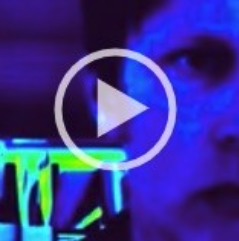
VART3614: Speaking Critically
In this course you will experiment with and develop skills to present a spoken narrative of your research.
You will develop and expand ways to contextualise and document your projects. This documentation will accompany your spoken presentation.
Spoken presentations are a vital way for graduates to introduce their research to broader audiences and contexts. Developing a well-defined, succinct, and effective spoken presentation built around a research narrative also serves as a step towards the language that will support your examined work.
You will analyse your Coursework Masters projects thus far to articulate your research narrative. Your spoken presentation will draw on your experiences in relation to this research, functioning to describe your projects, evaluate the outcomes, and articulate future directions, possibilities, and questions.
Also on offer in Semester 2 2021
Please find the link to the course guide.
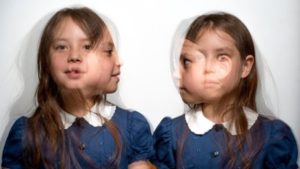
TOSHIRO SHIMADA/GETTY IMAGES
VART3616: Critical Frameworks B
So, there’s you, and then there’s everything else. With this in mind we explore models of multiple and mutable subjectivity throughout the modern period and their ongoing challenge to the autonomous subject inherited from the enlightenment. Of course, not everyone gets to decide for themselves who they will be, and so we explore theoretical models that have attempted to address the subject position of those who have been assigned to play ‘other’ to the privileged white male. We look at feminist art and ideas, and their heritage in post humanism as well as theories of the ‘other’ as developed through post-colonialism here and elsewhere. We also take in a variety of models of realism over the last 170 years of art history and theory as they attempt to address the world and how we might approach it.
This lecture series was previously offered in Sem 2, Year 2019. If you studied Critical Frameworks in that semester, we don’t recommend you enrol in this course.
Do not enrol in Critical Frameworks A and B at the same time, as they cover the same lecture content in the same semester.
Please find the link to the course guide.
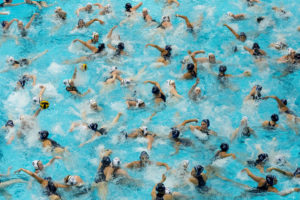
PELLE CASS 2018, ‘WATER POLO MATCH, HARVARD’, FROM THE SERIES CROWDED FIELDS. COMPOSITE PHOTOGRAPH
VART3638: Digital Imaging Strategies
Grounded in digital photography, this elective course introduces you to both foundational and advanced concepts and strategies in digital imaging. The classes foreground understanding over recipes – we want you to understand how computers handle images in order to equip you with the skills to be digitally literate creators.
Please find the link to the course guide.

Caelan Renfree-Dyer, Untitled, 2017, Ceramic, Photographer: Andrew Barcham
VART3640: Internship
In this course you will participate in an internship or artist in residence program in an arts or cultural organisation, company, festival, gallery, museum or studio, through dual negotiation with the industry and School. You will be expected to work as directed by the host organisation, to address and solve real issues in an arts industry workplace environment. Students will undertake a 'self-placement' of 42 hours with a host organisation and reflect on their experiences through three key tasks and expected to meet with the co-ordinating Lecturer four times over the semester to share and discuss their experiences. Assessments include arranging an Internship agreement with an Industry Host, keeping an Internship Journal and critically reflecting upon the experience.
This is a Work Integrated Learning (WIL) course designed to facilitate a practical working relationship between you and selected arts and cultural organisations. As a self-placement students find their own industry hosts appropriate to their area of study, with support from the co-ordinating Lecturer.
Also on offer in Semester 2 2021
Please find the link to the course guide.
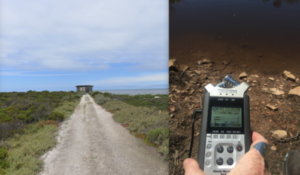
Fieldwork , Fiona Hillary
VART3709: Fieldwork
Fieldwork is a process driven elective course that encourages you as an artist/curator to explore your creative practice in response to a site. You will experience and develop methodologies that interrogate site specificity. For example, you will learn to understand the whole process of knowing a site from the journey to the site, the time spent on site, its socio-historical, cultural, environmental and political context and the ensuing impact that those experiences and knowledges can have on your creative practice. You will then learn to adapt and apply those methodologies that are appropriate for your creative development and practice.
Please find link to the course guide.
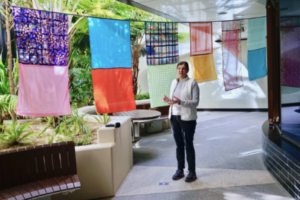
Sally Richmond (MA Art in Public Space), 2019, One and Many: The Sewing Project, Creative Care project, Peter MacCallum Cancer Centre Wellbeing Centre (image courtesy, Sally Richmond)
VART3711: Themes in Contemporary Creative Practice A - Creative responses to health, care and wellbeing
For this elective, you will develop and realise creative projects in response to health, care, wellbeing and the body.
Artists, photographers, creative, design, health, social and aged care and other practitioners will contribute to an interdisciplinary student community of practice and learn about creative, health and social responses to public health concerns including the COVID-19 and climate crisis.
Projects will be undertaken independently or collaboratively through diverse mediums, site specific and social practices, and realised through diverse creative outcomes, papers and proof of concept designs.
Please find the link to the course guide.

Caelan Renfree-Dyer, Untitled, 2017, Ceramic, Photographer: Andrew Barcham
VART3717: Cultural Planning and Evaluation - CANCELLED
Semester 2 - Masters Program Options

Caelan Renfree-Dyer, Untitled, 2017, Ceramic, Photographer: Andrew Barcham
OART1066: Arts Management Fundamentals
The course will examine key aspects of national and international arts management with particular reference to arts organisations in a cross-cultural context. This will entail a consideration of current practices in Australia and overseas with respect to economic, political and socio-cultural factors. You will be introduced to issues relating to: resource and fiscal management; fund raising; policy development and implementation; entrepreneurship; and marketing and communication.
NOTE: If you are enrolled in, or have previously completed PERF1025, you are not eligible to complete this course.
Please find the link to the course guide.
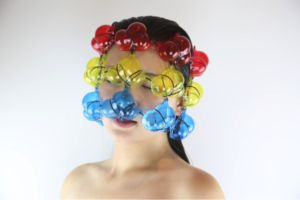
Zichun Apple Jia, "Cruel Beauty” (2017), Mask, plastic, rubber, 28x17x10cm.
Photo by: Kai Gao
VART3616: Critical Frameworks B
What does it mean to mean? How does meaning arise in material culture, and how has this question been approached in the western tradition? Over the course we consider this problem from a variety of vantage points: material culture as language; material culture as feeling; material culture as an extension of the body; material culture as form. This frame allows us to take in a number of elements of history that have affected our understanding of what art does: the linguistic turn that was so influential on twentieth century-culture and thinking; the history of modernism seen through a variety of lenses; the relationship of culture to philosophy since the renaissance; and the relationship of culture to embodiment before and after feminism. We weave the threads together with themes emerging and re-emerging across the weeks to build a series of interrelated narratives and contrasting positions that problematise and deepen our relationship to our making.
This lecture series was previously offered in Sem 2, Year 2020. If you studied Critical Frameworks in that semester, we don’t recommend you enrol in this course.
Do not enrol in Critical Frameworks A and B at the same time, as they cover the same lecture content in the same semester.
Please find a link to the course guide.

Caelan Renfree-Dyer, Untitled, 2017, Ceramic, Photographer: Andrew Barcham
VART3640: Internship
In this course you will participate in an internship or artist in residence program in an arts or cultural organisation, company, festival, gallery, museum or studio, through dual negotiation with the industry and School. You will be expected to work as directed by the host organisation, to address and solve real issues in an arts industry workplace environment. Students will undertake a 'self-placement' of 42 hours with a host organisation and reflect on their experiences through three key tasks and expected to meet with the co-ordinating Lecturer four times over the semester to share and discuss their experiences. Assessments include arranging an Internship agreement with an Industry Host, keeping an Internship Journal and critically reflecting upon the experience.
This is a Work Integrated Learning (WIL) course designed to facilitate a practical working relationship between you and selected arts and cultural organisations. As a self-placement students find their own industry hosts appropriate to their area of study, with support from the co-ordinating Lecturer.
Also on offer in Semester 1 2021
Please find a link to the course guide.
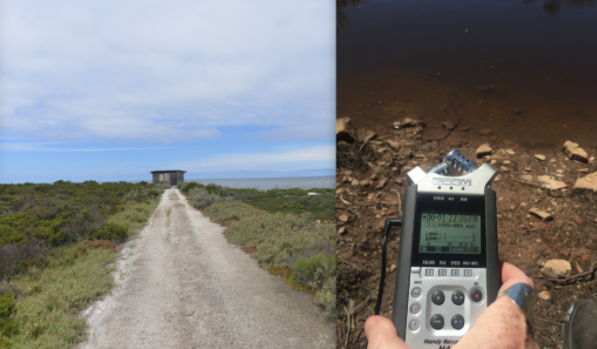
Fieldwork, Fiona Hillary
VART3709: Fieldwork
Fieldwork is a process driven elective course that encourages you as an artist/curator to explore your creative practice in response to a site. You will experience and develop methodologies that interrogate site specificity. For example, you will learn to understand the whole process of knowing a site from the journey to the site, the time spent on site, its socio-historical, cultural, environmental and political context and the ensuing impact that those experiences and knowledges can have on your creative practice. You will then learn to adapt and apply those methodologies that are appropriate for your creative development and practice.
Please find link to the course guide.

RAWPIXEL.COM VIA PEXELS, USED UNDER CREATIVE COMMONS.
VART3707: Applied Industry Engagement
This course explores ways to engage with expanded notions of industry for creative practitioners. You will interact with a variety of voices and positions from within the art, photography and wider arts industries to contribute to your evolving relationship to professional practice.
Please find a link to the course guide.

VART3614: Speaking Critically - CANCELLED
In this course you will experiment with and develop skills to present a spoken narrative of your research.
You will develop and expand ways to contextualise and document your projects. This documentation will accompany your spoken presentation.
Spoken presentations are a vital way for graduates to introduce their research to broader audiences and contexts. Developing a well-defined, succinct, and effective spoken presentation built around a research narrative also serves as a step towards the language that will support your examined work.
You will analyse your Coursework Masters projects thus far to articulate your research narrative. Your spoken presentation will draw on your experiences in relation to this research, functioning to describe your projects, evaluate the outcomes, and articulate future directions, possibilities, and questions.
Also on offer in Semester 2 2021
Please find the link to the course guide.
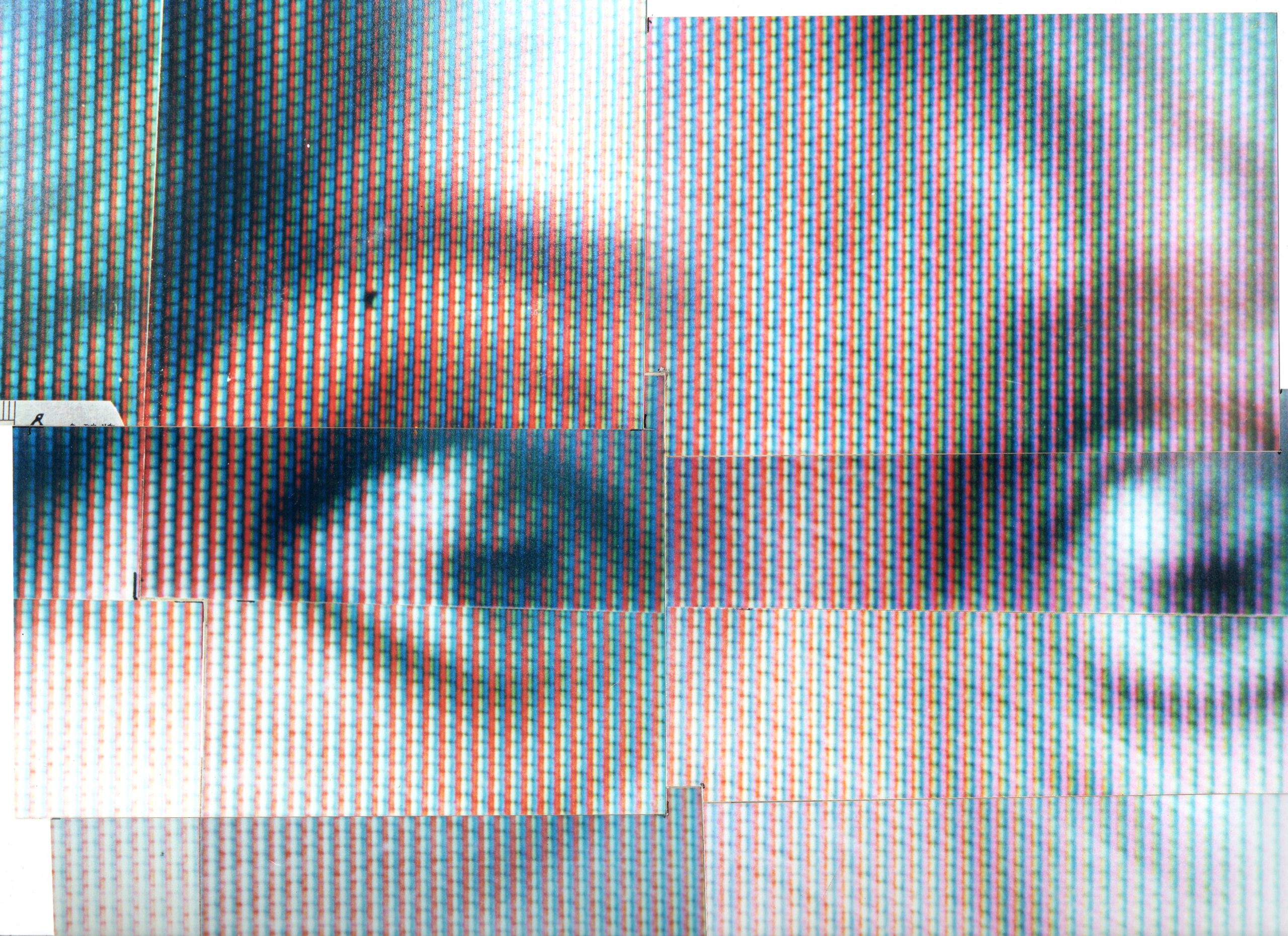
Courtesy Steven Rendall
VART3713: Themes in Contemporary Creative Practice B: Figuration, Representation & Virtuality
In this course we will investigate the overlapping fields of figuration and representation in relation to contemporary contexts and technologies. We will investigate how the human form collides with various ‘representational’ technologies. What are the results of this collision? What can be salvaged from the wrecked image and what is Post–Representation? What reality do we want to prioritise and activate when encountering images of the human form? We will study and discuss various theorists, artists and academics who have been problematising the relationship between images and reality. You will have the opportunity to develop methodologies and outcomes in a form that is appropriate to your chosen interest and/or creative practice.